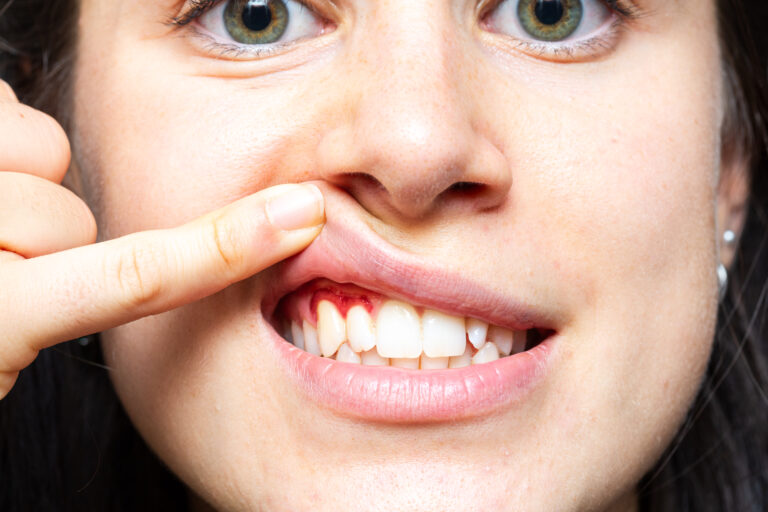
Early Gingivitis Detection at Klinik Pergigian Prima Senawang, Seremban
Living in Seremban and looking to keep your smile bright and healthy? Look no further than Klinik Pergigian Prima Senawang! We’re dedicated to providing comprehensive dental care for the whole family, and a crucial part of that mission is protecting your smile from the threats of gum disease. Early detection and treatment, particularly for gingivitis, is key to keeping your gums healthy and preventing future problems. Let’s explore why early gingivitis detection matters and how Klinik Pergigian Prima Senawang can be your partner in maintaining a healthy, happy smile.
Gum disease is alarmingly prevalent in Malaysia. According to the National Oral Health Survey of Adults 2000 conducted by the Ministry of Health Malaysia, a staggering 9 out of 10 dentate Malaysian adults (those with teeth) are affected by various stages of periodontal (gum) disease—a chronic inflammation of the soft and hard tissues supporting and anchoring the teeth. By prioritising early detection and proactive care, we aim to keep your gums healthy and enhance your overall well-being.
What Is Gingivitis and How It Affects Oral Health
Healthy gums are the foundation of a beautiful, healthy smile. But what happens when those gums become inflamed and irritated? That’s gingivitis, a common gum disease caused by plaque buildup along the gum line. Plaque is a sticky film teeming with bacteria that forms on teeth if not removed through proper brushing and flossing.
This bacterial buildup irritates the gums, leading to inflammation and symptoms like redness, gum pain, swelling, and bleeding gum. While gingivitis itself isn’t usually painful, it’s a warning sign that shouldn’t be ignored. If left untreated, gingivitis can progress to periodontitis, a severe gum disease that can damage the jawbone and lead to tooth loss. Once it reaches the stage of periodontitis, unfortunately, it becomes incurable. Gingivitis can also contribute to bad breath and negatively impact your overall well-being. The good news is that gingivitis is completely reversible with proper oral hygiene and professional dental care.
Common Signs and Symptoms of Gingivitis or Gum Disease
Gum health is often an overlooked aspect of oral hygiene, but it plays a vital role in maintaining a healthy smile. Gingivitis, an early stage of gum disease, can develop silently, but there are some telltale signs you shouldn’t ignore. Here at Klinik Pergigian Prima Senawang, we want to empower you with knowledge to recognize these signs and symptoms of gum disease early on.
- Bleeding Gums: Healthy gums don’t bleed. Regular bleeding gum during brushing or flossing is a red flag for potential gum pain.
- Red & Puffy Gums: Check if your gums are pink and firm. Redness and swelling suggest plaque-related inflammation, often accompanied by gum pain.
- Gum Recession: Gums receding from teeth, exposing roots, and causing sensitivity indicate progressing gingivitis, which can lead to bleeding gum and discomfort.
- Bad Breath: Ongoing bad breath, despite good oral hygiene, can be caused by the bacteria in plaque.
- Tenderness: Any discomfort or tenderness in gums, particularly when eating, might be a symptom.
If you’re experiencing any of these symptoms, don’t hesitate to schedule an appointment with us. Early detection and treatment of gingivitis is crucial to maintain healthy gums and a beautiful smile.
Importance of Early Detection and Treatment
So, you’ve spotted some signs of gingivitis. While it might seem like a minor issue, here at Klinik Pergigian Prima Senawang, we want to emphasise why catching it early is a major victory for your smile. Think of it like catching a tiny tear in your favourite shirt – the sooner you address it, the easier it is to fix and prevent bigger problems.
Here’s why early detection and treatment of gingivitis is a win-win:
- Simple Solutions
- Reversible gingivitis with better oral care and clinic cleanings.
- No complex procedures, just dedication to oral hygiene.
- Cost-Effective Care
- Early treatment, such as teeth scaling and polishing, is more affordable than advanced gum disease care.
- It’s an investment in long-term oral health.
- Saving Your Smile
- Early gingivitis treatment prevents bleeding gum, tooth loss, and gum pain.
- Maintaining early care keeps your smile healthy.
- Protecting Overall Health
- Gum health impacts overall well-being, potentially affecting heart health and diabetes management.
Dentist Treatment for Gingivitis in Seremban
At Klinik Pergigian Prima Senawang, we understand that gingivitis can be a concern, but we’re here to help and offer comprehensive teeth diagnostic services to identify and treat it effectively! Here’s what you can expect when you visit us for gingivitis treatment:
- Comprehensive Consultation: We’ll start by thoroughly examining your gums and teeth, discussing your oral hygiene habits, and addressing any concerns you may have.
- Professional Cleaning: Our hygienists will use specialized tools and techniques to gently remove plaque and tartar buildup from your teeth, promoting healthy gum tissue.
- Personalised Advice: We’ll work with you to develop a personalized oral hygiene routine that includes proper brushing and flossing techniques to prevent future plaque buildup.
- Treatment Plan: Depending on the severity of your gingivitis, we may recommend additional treatments such as antibiotic mouthwashes or deeper cleanings (scaling and root planing) to address persistent infection.
Remember, early detection and treatment are crucial for successfully reversing gingivitis. Don’t wait for symptoms to worsen! Schedule an appointment with Klinik Pergigian Prima Senawang in Seremban today. Let’s work together to keep your smile healthy and confident.
